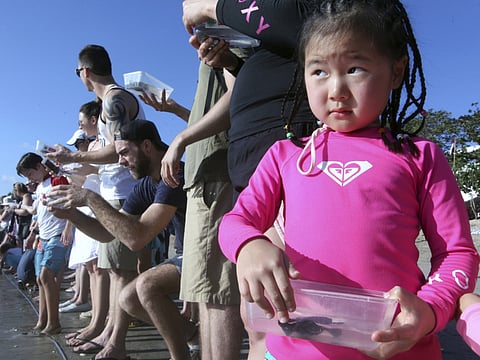Why the tide is shifting towards marine conservation
Conservation efforts have turned to the last frontier — the oceans — to protect marine species and environments from further human destruction

The core goal of the conservation movement, in all its currents, is to protect the autonomy of natural forms of life. Because without conservation, human engineering could soon replace natural selection.
In its early days, conservationism concentrated its efforts on land species and environments. The concept of the national park prospered and spread. Today, 10-15 per cent of all land surfaces is, to some degree, designated a protected area. But what about the sea? The sea is a recent arrival at the conservation forum. For centuries, nobody thought of the ocean as needing protection. It seemed so vast, infinite and inexhaustible.
This explains the zeal with which whales were hunted in the 19th and 20th centuries. Within a short time, this pursuit showed how, with a bit of enterprise and technology, people could bring such spectacular forms of life as the blue whale to the brink of extinction. And yet, even as fantasy of the limitless oceans began to dissipate, large-scale exploitation — with the industrial fishing fleets of the 20th and 21st centuries — continued. Little by little, the sea is being drained of life and filled instead with trash and pollutants. Our filth is there today in the waters and on coastlines, and our poisons in the flesh of sea creatures.
The scale and the pace of destruction in the seas have had an unexpected result, namely an about-face on the need to protect marine species and environments. Now, the sea is the star of conservationism. Congratulations! The objective today is to reserve 10 per cent of all seas as protected zones (from insane fishing and activities that degrade the environment and destroy life-forms).
In Argentina, marine conservation growth began, halfheartedly, with coastal protection. But it has progressed faster in recent years, reaching a milestone in 2013 with the declaration of the underwater Burdwood Bank as a marine protected area. Since then, the Argentine government has announced plans to create more marine national parks. Eight such areas were created worldwide between 2009 and 2016, raising the total protected marine surface area in the world to 2.8 per cent from 0.8 per cent. That’s still way off the 10 per cent-mark. But for those of us involved in marine conservation, it’s also a reason to feel both satisfied and optimistic, especially considering that until very recently, people were sceptical about any talk of marine conservation.
This optimism, however, raises the question of whether our growing interest in safeguarding the seas is because we’ve given up on protecting land areas. The answer is no. An emphatic no. At least let’s hope so, because across the globe, big farming is eating into forests and plains; desertification follows the bulldozers; and populations are even exerting unceasing pressure on exceptionally important national parks. Could these indicate a crisis in land conservation?
The oceans are the last frontier, with areas that are still relatively unexplored and untouched. Those place provide us with creative opportunities, such as the creation of seasonal national parks to protect species at crucial points in their lives, or mobile marine parks focused on productive areas like the “frontal zones”, where marine animals and intensive fishing meet.
The sea is currently living its 15 minutes of fame. In Argentina, there has been a surge of awareness in recent years, with numerous seminars being organised by organisations like the Wildlife Conservation Society, the Ecocentro observatory in Puerto Madryn and Conicet, the state research institute. As the Science Ministry argues, Argentina’s sea areas are its “blue pampas”.
All these initiatives are welcome. Indeed, in this era of significant human impact on the environment — what some call the Anthropocene epoch — species and spaces need all the help they can get to retain their autonomy. Conservation, in other words, is crucial. For all the intensive fishing and pollution they’ve had to endure, the seas still have some autonomy. It’s our job to make sure it stays that way.
— Worldcrunch/New York Times News Service
Claudio Campagna is an Argentine physician and biologist.



